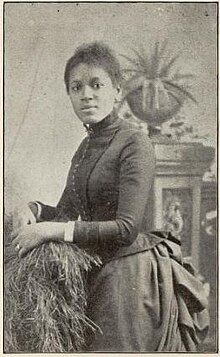Lucy Coles

Lucy Ann Henry Coles (born 1865) was an American missionary who travelled to Liberia with her husband John J. Coles.[1][2] She was one of the first black women missionaries in Africa.[3] She also served as president of the Baptist Foreign Mission Convention after her husband's death. Elizabeth Coles Bouey was her daughter.[4]
She was from Tennessee. She moved to Richmond at 10 and studied in public schools and then Hartshorn Memorial College for a short time until she married Rev. Coles.[5]
In 1898, Z.D. Lewis delivered what Coles described as a fiery speech opposing her attempt to collect funds for mission building in Liberia. Lewis was serving as moderator of the Richmond Minister's Conference.[6]
In Liberia, she helped her husband with his work at the Bendoo Baptist Mission and was a teacher.[1]
Life and work
Lucy Ann Henry was born in 1865 in Richmond, Virginia. As a child, she had to care for her siblings and mother, who was disabled. She attended the Ebenezer Baptist Church. She became a teacher as an adult, where she met John J. Coles, a missionary to Africa.[3]
Henry attended Hartshorn Memorial College, where she completed the missionary training program.[3] On December 21, 1886 she married Coles.[7] In January 1887, the couple went to Sierra Leone to work at Jundoo Mission Station. Coles ran the mission house and oversaw childcare.[3]
After returning to the U.S. in 1895 due to his ill health, her husband died. She took over the remainder of his term as president of the Baptist Foreign Mission Convention.
Coles and her husband were the last missionaries in Grand Cape Mount. The tropical climate took its toll, challenging relations with the indigenous Vai people, and there was the difficulty of communications with sponsoring churches back home in the United States.[8]
Further reading
- Murphy, Larry G., J. Gordon Melton, and Gary L. Ward. Encyclopedia of African American Religions. Routledge: Abingdon (2013). ISBN 1135513384.
References
- ^ a b Hine, Darlene Clark (19 December 1990). "Black Women in American History: The Twentieth Century". Carlson Pub. – via Google Books.
- ^ Sandy Dwayne Martin, Black Baptists and African Missions: The Origins of a Movement, 1880-1915 (Mercer University Press 1989): 88. ISBN 9780865543539
- ^ a b c d Bettye Collier-Thomas (2 February 2010). Jesus, Jobs, and Justice: African American Women and Religion. Knopf Doubleday Publishing Group. pp. 220–221. ISBN 978-0-307-59305-4.
- ^ Sandy Dwayne Martin, Black Baptists and African Missions: The Origins of a Movement, 1880-1915 (Mercer University Press 1989): 88. ISBN 9780865543539
- ^ "Beyond Maggie Walker: 6 Other Richmond Women from the Turn of the Century". February 12, 2018.
- ^ Martin, Sandy (1989). "Black Baptists and African Missions: The Origins of a Movement, 1880-1915". Mercer University Press. Retrieved 4 June 2018 – via Google Books.
- ^ Walston, Vaughn J.; Stevens, Robert J. (19 December 2018). "African-American Experience in World Mission: A Call Beyond Community". William Carey Library – via Google Books.
- ^ Heywood, Linda; Blakely, Allison; Stith, Charles; Yesnowitz, Joshua C. (January 30, 2015). "African Americans in U.S. Foreign Policy: From the Era of Frederick Douglass to the Age of Obama". University of Illinois Press – via Google Books.
